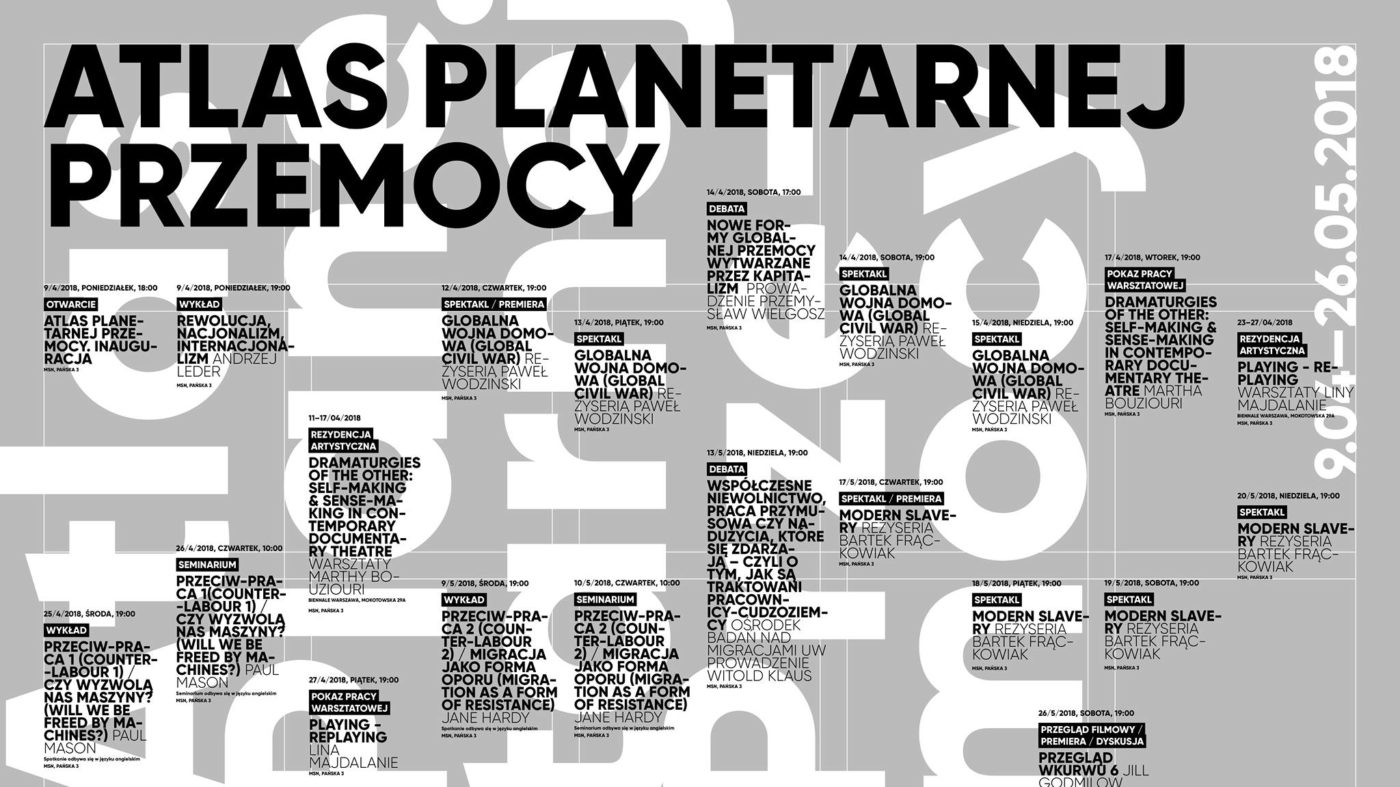Counter-Labour
Paul Mason, Jane Hardy, Harry Cleaver

Lectures and seminars at the Muzeum na Pańskiej.
COUNTER-LABOUR
Historical gains of the working class and the worker’s movement, such as political and social democracy, are being challenged today. Does this mean that the emancipatory role of a struggle between male workers and female workers has been exhausted? The main thrust of public debate in Europe for years has seemed to have no doubts about this matter. New forms of capitalism – financially irradiated, globalized, digitized – refer traditional problems related to work – its function and meaning for system reproduction – into the dustbin of history. Technological progress itself changes the world and determines that labour relations have ceased to be an important battlefield for the shape of our lives.
Or maybe the fact that so far no new actors on the leftist scene have been able to achieve similar effects as the former workers’ movement, testifies to the need to rebuild the political strength of workers? Recent years have successfully overturned most theories about the end of work from the beginning of the 21st century. The economic crisis, the Arab Spring and Occupy movements, rebellions in Chinese and Bengali industrial zones, general strikes in India remind us that the employee issue is in the very heart of the world in which we live. Antagonism between the workforce and the capital has not vanished. Today it is up to the resistance and struggle of employees whether the compulsion of work will continue to define the framework of our existence or whether it will be overcome. In other words, the dream of an emancipatory counter-labour movement will not be fulfilled without a fight in the field of production relations.
What is the map of contemporary workers’ movements like? What is their specificity? In the current conditions, is conflict on the line working – capital plays a key role in social change? Are labour relations – dispersed, destabilized, globalized still the degree of social reality, where the subjectivity of the folk classes can find a point of support for its politicization and thus influence the social forces?
Program
COUNTER-LABOUR 1
WILL WE BE FREED BY MACHINES?
PAUL MASON
Crisis and its social consequences have clearly shown that capitalism does not work. Do we have any idea what could replace it? Instead of indulging in utopian visions, Paul Mason suggests seeking for harbingers of another, a fairer world in the reality that surrounds us. Falling capitalism carries the core of post-capitalism. The level of technical development, the expansion of new information technologies, or robotization create grounds for the forms of social cooperation, the creation of subjectivity, direct democracy, as well as transformations of the economy that can free us from the necessity of work. What are the barriers to post-capitalism? What conditions must exist to make it possible to go beyond capitalism?
lecrure by Paul Mason | 25.04.2018, 19:00
seminar by Paul Mason | 26.04.2018, 10:00
hosted by Edwin Bendyk Mikołaj Ratajczak
COUNTER-LABOUR 2
MIGRANT, INDIGENOUS WORKERS AND NEW SOLIDARITIES: THE CASE OF BRITAIN
JANE HARDY
Migrations have accompanied capitalism since its inception. Until now, cross-border transfers of labour may be a source of great profits and a form of violent management of subordinated classes, they constitute political capital for the extreme right-wing and a pretext for the expansion of new forms of control and discipline. At the same time, however, they create a space for the new forms of solidarity and a struggle for workers’ subjectivity. On the basis of the situation in Great Britain, Jane Hardy looks at examples of self-organization of migrant workforce and alliances against ethnic, cultural and civic divisions in the name of the recovery of political rights and aspirations that modern capitalism so fiercely fights.
lecture by Jane Hardy | 9.05.2018, 19:00
seminar by Jane Hardy | 10.05.2018, 10:00
hosted by Magda Malinowska
COUNTER-LABOUR 3
RUPTURING THE DIALECTIC. THE STRUGGLE AGAINST WORK IN FINANCIALIZATION ERA
HARRY CLEAVER
Financialization of the economy since the 1970s is not a process resulting from the autonomous logic of economic expansion. Harry Cleaver argues that it was the answer by capitalism to the growing strength of workers’ protests. Policies imposed by the financiers (belt-tightening, privatization of public services and social security systems, precarization of labour) trigger new forms of resistance of the workforce. Movements such as indignados, Occupy, or new parties such as Podemos and Syriza, in a different way and to a different degree represent opposition to work in the era of financial capital. Are they capable of developing an effective strategy of resistance to the complex of financial authorities and the state supporting it?
lecture by Harry Cleaver | 23.05.2018, 19:00
seminar by Harry Cleaver | 24.05.2018, 10:00
hosted by Krzysztof Król
| Data | Czas | Tytuł | Miejsce | Wstęp |
|---|---|---|---|---|
|
May 24 2018
, 10:00
Thursday
|
10:00 |
Counter-Labour |
Museum of Modern Art in Warsaw | Registration is closed |
|
May 23 2018
, 19:00
Wednesday
|
19:00 |
Counter-Labour |
Museum of Modern Art in Warsaw | Free entry |
|
May 10 2018
, 10:00
Thursday
|
10:00 |
Counter-Labour |
Museum of Modern Art in Warsaw | Registration is closed |
|
May 9 2018
, 19:00
Wednesday
|
19:00 |
Counter-Labour |
Museum of Modern Art in Warsaw | Free entry |
|
April 26 2018
, 10:00
Thursday
|
10:00 |
Counter-Labour |
Museum of Modern Art in Warsaw | Registration is closed |
|
April 25 2018
, 19:00
Wednesday
|
19:00 |
Counter-Labour |
Museum of Modern Art in Warsaw | Free entry |